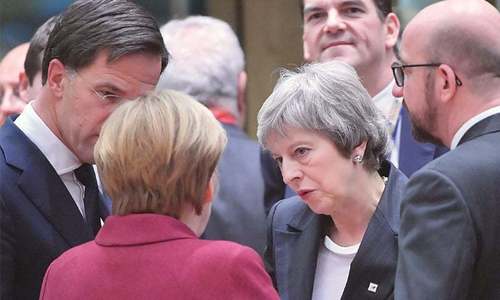
Britain's lawmakers are set for a momentous third vote on Friday on Prime Minister Theresa May's Brexit deal, which could end a months-long political crisis or risk the United Kingdom crashing out of the European Union (EU) in two weeks.
The House of Commons has twice rejected May's withdrawal agreement, both times by large margins, but has been unable to agree any alternative ─ and time is running out.
The pivotal vote takes place on the day Britain was supposed to leave the European Union, until May asked the bloc's leaders last week for a little more time.
In a last-ditch bid to garner the support of discontented Conservative colleagues, she dramatically promised on Wednesday to resign if the deal passed.
She appealed to Brexit supporters to back her, saying that under the delay plan hatched with Brussels, approval on Friday could see Britain out of the bloc on May 22.
But if the deal falls again, she must set out a new plan by April 12 ─ with the options including a potentially catastrophic "no deal" Brexit, or a lengthy delay.
Read: Ready for Brexit or not? How Britain could be affected
May's sacrifice swayed some of her critics, including former foreign minister Boris Johnson, but more than a dozen Conservative MPs still publicly oppose her deal.
Her Northern Irish allies, the Democratic Unionist Party (DUP), also continue to insist that its arrangements for the Irish border are unacceptable.
Without the support of her own side, May would have to rely on opposition Labour votes to get her deal through, but leader Jeremy Corbyn has vowed to vote against her.
'Give people certainty'
Britain is leaving the EU after 46 years of membership following a divisive 2016 referendum in which voters decided 52 to 48 percent for Brexit.
Explore: Brexit deal, the end of a loveless 46-year marriage
But MPs appear incapable of agreeing on how to implement the result, reflecting the nationwide divisions that persist on the issue.
The ensuing chaos has led business leaders and trade unions to warn of a "national emergency", while the pound slipped again on Thursday amid fears of what might happen.
May admits her agreement, reached last November during more than 18 months of negotiations, is a compromise but insists it is the best available.
It covers citizens' rights, Britain's financial settlement, plans for the Irish border and for a transition period to ease the split until new trade terms are agreed.
Ardent Brexit supporters say it keeps Britain too close to the EU, but others say it does not do enough to protect relations with Britain's largest trading partner.
The crunch vote caps a tumultuous week in Westminster which also saw MPs seize control of parliamentary business for a day to test support for various Brexit options.
However, none of the eight options drawn up by various lawmakers secured a majority, although they are hoping to narrow down the field in another round of votes next Monday.
Any new approach at this point would likely require a much longer extension that would force Britain to take part in European Parliament elections in May.
"The EU will only agree an extension until 22 May if the withdrawal agreement is approved this week," said senior minister Andrea Leadsom.
"I encourage all MPs to support it and ensure that we leave the EU... giving people and businesses the certainty they need."
'Blindfold Brexit'
MPs were not originally due to sit on Friday but the government called an emergency session, starting at 9:30am (0930 GMT) with voting due at 2:30pm (1430 GMT).
Related: Chief characters in Britain's Brexit saga
There was some debate over whether it could even take place, after Commons Speaker John Bercow blocked a similar vote last week, on the grounds that MPs had already clearly rejected May's deal.
He gave the green light after the government decided to put only one part of the Brexit package to MPs, separating out the withdrawal terms from an accompanying political declaration on future ties.
This satisfies the EU's request for approval of the withdrawal agreement, but means another vote might be necessary on the declaration before the deal is implemented.
Labour leader Corbyn strongly criticised the move, saying his party would not agree to a "blindfold Brexit".













































